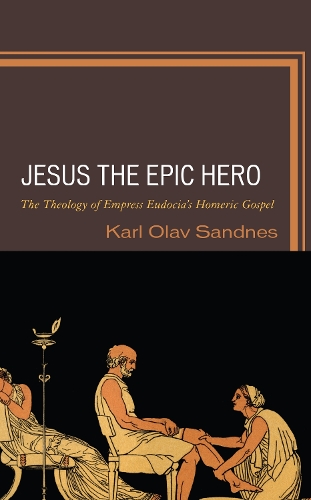
Jesus the Epic Hero: The Theology of Empress Eudocias Homeric Gospel
(Hardback)
Publishing Details
Jesus the Epic Hero: The Theology of Empress Eudocias Homeric Gospel
By (Author) Karl Olav Sandnes
Bloomsbury Publishing PLC
Lexington Books/Fortress Academic
29th August 2022
United States
Classifications
Professional and Scholarly
Non Fiction
Christianity
European history: the Romans
History of religion
The arts: general topics
883.01
Physical Properties
Hardback
206
Width 157mm, Height 237mm, Spine 22mm
490g
Description
The ancient cento-genre was prone to be used on all kinds of subjects. New texts were created out of the classical epics. Empress Eudocia followed this practice and composed the story of Jesus in lines lifted almost verbatim from Homers epics. Jesus and his relevance to her audience is thus presented within the confines of style and vocabulary offered by the Iliad and Odyssey. The lines picked to convey her theology are often clustered around key Homeric motifs or type scenes, such as warfare, homecoming, feast, reconciliation, hospitality. Jesus waging war against all evil and Hades in particular runs throughout this Homeric and simultaneously biblical epic. The story starts in the Old Testament which is conceived as a divine counsel on Mt. Olympus where a plan to save sinful humanity is presented. The narrative then follows the biographic lines of the canonical gospels, with Johns Gospel holding pride of place in the way she renders and interprets the Jesus-story. The story told suspends both the geography and time of Jesus. Eudocia preaches the story she tells. She emerges in this poem as one of the most, if not the most prolific female theologian and preacher in the first Christian centuries.
Reviews
Over 1,000 years before Milton put classical epic to work to assert eternal Providence and justify the ways of God to Man in Paradise Lost, there was Eudocia, who in retelling the Christian story of salvation with lines from Homers Iliad and Odyssey composed a theological poem of unusual communicative power. This is a womanan empress, no lesswho, as Karl Olav Sandnes puts it, insists on being heard, at a time of charged theological debate dominated by men. Sandnes presents Eudocias poem as an original, even idiosyncratic, interpretation of the Gospels that weaves together Christian and pre-Christian strands of tradition into one rich tapestry.
-- M. D. Usher, The University of VermontThis is a careful study of Eudocias representation of Jesus as a Homeric hero in her Homerocentonesa very fine investigation into the work of an ancient, refined female author against the backdrop of Biblical passages silencing women, which Eudocia turns upside down. This intriguing research delves into one of the many ways in which classical culture and Christianity intersected in late antiquity in amazingly productive ways.
-- Ilaria L.E. Ramelli, Durham University and University of CambridgeAuthor Bio
Karl Olav Sandnes is New Testament professor at MF Norwegian School of Theology, Religion, and Society since 1993.
